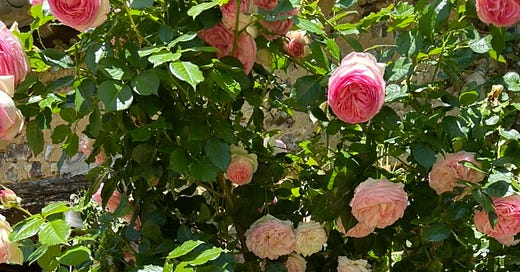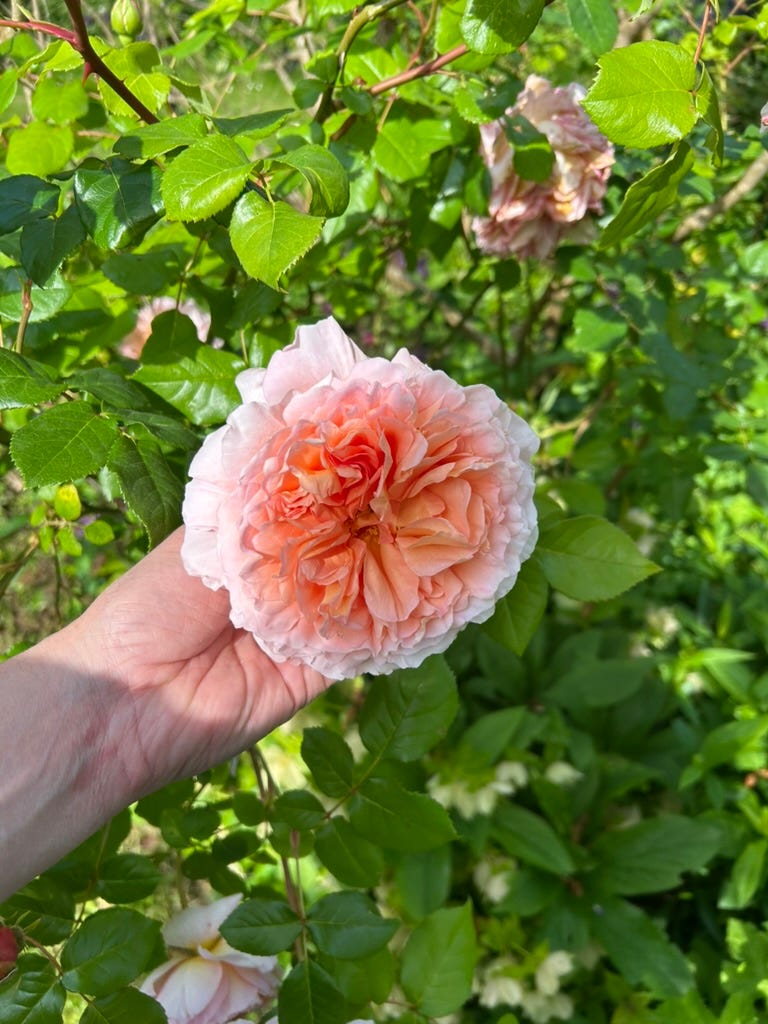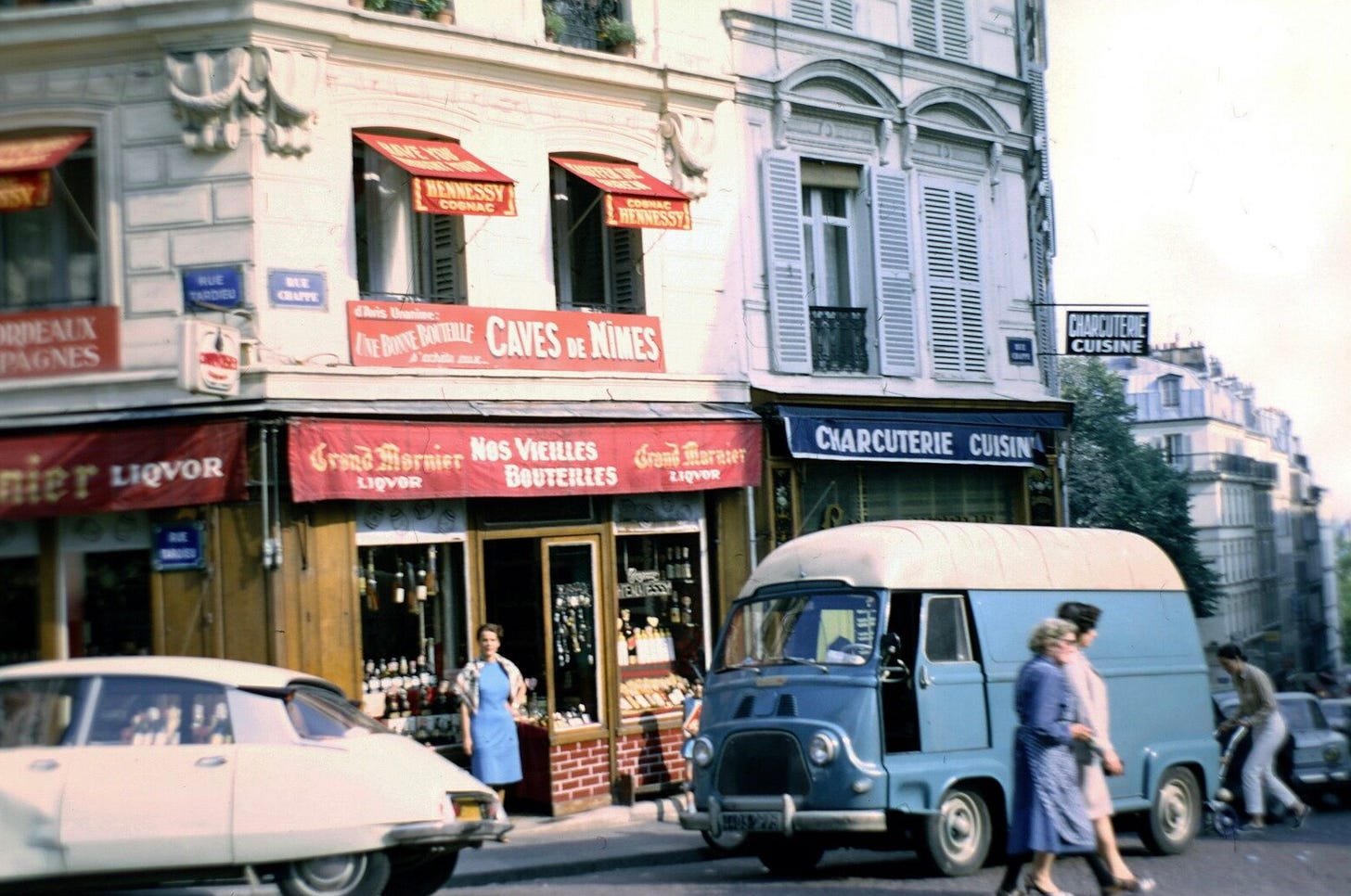Unsung Heroines
How many women artists have been done like Cassandre? More than you will ever know.

It has been a full couple of weeks for Cassandre, who celebrated her 74th birthday yesterday surrounded by her children and grandchildren, and me, “her Perche kid,” as I was dubbed by her eldest daughter. Cassandre’s sons grilled steaks, her son in law opened an exceptional Givry 1er cru, and her youngest grandson, just two, met his grownup cousins for the first time. He was starry-eyed.
Time is often full for Cassandre. She has been retired for over a decade but continues to lead writing workshops and self-publishes at least a book a year. Under her own steam, she has written a very good memoir, scads of short stories and many adventure novels. Her first book was published by a respectable company, but since then, the literary establishment has pretty much ghosted her. She always figured her profile just wasn’t sexy enough to get her foot in the door: she worked a string of random jobs and had four kids. Even though the true-life stories of derring do that she tells me night after night have me howling on the floor, that’s not enough for risk-averse publishers. That’s a song I know well myself.
Nevertheless, she persists.
“Now all I want to write is poetry,” Cassandre said about six months ago. A month after that, she published a collection whose book signing in Saint-Jouin I wasn’t able to make.
Poetry was what Cassandre started with as a writer, when she was still a dreamy, haunted kid growing up in 1950s Paris. She kept it up when she was sent away to Catholic boarding school, and through an aborted stint in art school, the only higher education she ever got. As the only girl in her very mixed-up family, she was supposed to get married.
Cassandre’s latest work is full of reminiscences of childhood, and nature metaphors and wonderment. At the signing I couldn’t attend, a waifish, 60-something American dramaturg called Cindy whom Cassandre knew from a now-defunct jazz dive bar about ten minutes from Saint-Maxime, asked her if she could adapt the poems for the stage. This is how I found myself in a community rec center three weeks ago watching a performance that Cassandre graciously called, “original.”
Cassandre and three other local creatives of varying ages, all dressed in black, traded lines of her verse striking various poses and postures. There were homemade sets laden with symbolism—a backdrop of mimeographed pages covered in crinkly plastic, and lighting rigs wrapped in blue tarp and white bedsheets, lit to glow from within. Near the end of the show, a visual vignette revealed Cassandre seated on a stool, her face entirely veiled by a purple Indian scarf, sprinkling torn up pages over the prostrate body of the youngest of the players, who is by day a junior high school French teacher. Cindy, clad in a tunic covered in cursive script, flitted out wordlessly to join them. She danced across the scene to encase herself inside the plastic fort at stage right, where she performed a blurry pantomime depicting either the act of writing or choking on a ham sandwich.
The rehearsals were brutal, Cassandre told me. I’ve met Cindy a few times. She has a hippie aesthetic and a bubbly, friendly affect. Apparently that disappeared once she was invested with power. This was a tough pill for the players, who would rehearse in chilly, empty municipal spaces all day, with little time for breaks.
“She keeps the room freezing, Alexandra! I just can’t!” Cassandre told me, coughing, one night over drinks and snacks at her place. “She gets mad at us when we forget our direction. She’s so strict with the blocking. What are we doing?”
Cassandre assured me that she didn’t try to take control of the process, except to insist that they be allowed to read the texts rather than memorize them. Abstract verse off-book for an hour-plus when you have a life outside of community theater, as they all do, was just too big an ask. Cindy begrudgingly accepted.
The room was almost full on the opening night of a two-Saturday run. I sat next to Jean-Yves a few rows back and we tried to remain composed as Cassandre and the others did their level best. The poetry was honestly quite lovely. Some of the compositions dated back to when Cassandre was a mother with two young girls and baby Jean-Yves, unhappily wed to a much more conventional man.
She and Robert met at one of the gloves-and-petticoats cotillions she attended, thrown by families much wealthier than hers. She had been sponsored, Jane Austen-style, by her best friend Sylvie’s mother, a woman from a major French clan whose name some of you would recognize if I revealed it. She liked Cassandre’s intelligence and big heart and general orignality—qualities not often valued enough in young women at the time—so she made it known that Cassandre should be included on guest lists, and that was her entry into society.
Sylvie was being fixed up with Robert that night. His family wasn’t noble like hers and Cassandre’s, but it was properly loaded. Sylvie and Cassandre decided to switch names for shits and giggles. There were just so many cotillions, you had to do something to break up all the politesse. In a twist worthy of England’s greatest chronicler of social climbing, Robert couldn’t believe his luck when “Sylvie” turned out to be blonde and buxom and wild-eyed and witty. Eventually, Cassandre revealed the prank. By now the arrow had struck Robert, and Sylvie would have to find someone else.
“I promise you, you don’t want me,” Cassandre said to her suitor. “There are far better prospects around this joint.”
Robert begged to differ, and so at age 19, our bouncing ingenue walked down the aisle with him. Three kids came in succession. Cassandre liked being a mother, even if Robert turned out to be a bit of a snooze. She raised her babies on aristocratic manners and uncensored movies, and did whatever she could to avoid her mother in law, who thought she was a beast from a fallen family. Sure, Cassandre’s two older brothers were in jail, but how was that her fault?
Eventually, all this living for other people drove Cassandre into a depressive ditch. Robert kept her on a tight leash, but Cassandre couldn’t take not writing anymore and told him she wanted to pursue her poetry. As long as dinner was on the table, he didn’t seem to care much about the state of her muse. So she picked up her notebooks again.
Cassandre sought freedom in other ways, including an ill-advised affair with her doctor, who wanted to be a writer himself. She had that French thing of putting amorous passion at the top of her list, and common sense somewhere further down. (She still does.) Cassandre helped her lover with his manuscript, which he submitted to the most prestigious French publishers, and was rejected every time.
Our perfectly coiffed, red-manicured housewife got out into the cultural mix when she could get away from home. She reviewed films for a poetry revue, and started hanging out at readings, “in dark rooms where everyone’s hair smelled terrible,” she told me. One night a literary lion appeared in the club and sat down next to her in the dark. He was a poet-philosopher who translated American writers into French, the bestie of the best-known post-structuralists. When he asked her her name, and she told him, the poet told her he admired her work. It smelled like bullshit to Cassandre.
“How do you know my writing?” she asked. “I’m unpublished.”
He was on the selection committee of the very best of the houses that Cassandre’s doctor lover sent his memoir to, and the doctor’s mansuscript quoted her liberally. He wasn’t lying. Ladies, start your engines!
The poet and Cassandre’s affair heated up quickly, even though she and Robert were starting to negotiate the terms of their separation and Cassandre had so much on the line. How could it not? The poet was legitimately brilliant, and he legitimately admired her talent. He would mentor her, she was sure of it.
One Saturday night she snuck away to see the poet in a borrowed apartment. Dressed in evening clothes, she took her car, a rattle-bang sedan whose only working brake was the emergency one. She lurched along the Parisian streets, cigarette dangling from her pink lips, yanking that brake up at every red light. Luckily, she found a parking spot in front of the building. And then when she came downstairs at the crack of dawn the next morning, her car was gone. It had been towed, a passer-by on the street told her, after someone rolled it into a red zone to take her place for himself. Merde.
She needed to get to the impound lot on the northern edge of the city in time to retrieve the car and make it home for lunch with Robert, the kids and her mother in law. But it was Sunday morning, and no one was around. She spotted her car, edged over to it, lit another cigarette and started hacking away at the police tape that sealed the doors. She almost managed to drive it off the lot before a security guard caught her. Next thing she knew she was arrested and hauled before a judge. “I was in the holding tank in last night’s clothes with all these prostitutes,” she said. “Can you imagine?”
Cassandre’s family may not have been possessed of a vast fortune, but a lot of them were military heroes, and she was not without connections. A casual mention of an in-law who was a friend of a minister was enough to get her bounced out of there on the double. Nobody wanted to get their hands even dirtier on a Sunday morning. She strode out, head high, mascara smudged, and made it in time to sit down at the table for a serving of very silent crow. “Nobody said a word,” she told me. It was probably better that way.
Nobody saying a word works until it doesn’t. The poet would break every promise to Cassandre that he ever made. He would never leave his wife. He would never submit the writing he so vocally but privately admired to any of his colleagues. He was afraid their affair would be found out. Like so many artist men have done to their artist lovers since the dawn of patriarchy, he loved her just to bury her. There is rarely room for two geniuses in one couple when one of them is a high profile man.
I was once in a relationship with an iconic writer, so I know of what I speak. He was a novelist, not a poet, and he too promised to form me into the writer we both knew I could be. Thankfully, he had a nervous breakdown just months into our couple, so I would never waste years like Cassandre did, and like the next woman he took up with did. He was permanently set to search and destroy aspiring and frustrated women writers. It’s a thing.
On the closing night of Cindy’s show, Cassandre and her fellow players decided they would form a repertory company. They liked working together, have a lot of the same ideas about theater—ie, not Cindy’s—and Cassandre would love to try her hand at playwriting. I say go for it, Cassandre. If the wider world never gave you your flowers, Saint-Maxime always will.






That you just happened to buy a house a few yards from the formidable “Cassandre” is such a gift of the gods. Maybe the best part of life is having supportive, interesting friends. You really were destined for that little hamlet where you are blooming along with the roses.
Such a familiar story. The guy who meets you and thinks, "I can use that." Maybe not put that directly, but that's how it plays out. His friends think they are being nice when they refer to you as his "muse" as they appraise your looks. If conversation reveals that you also have a brain, bonus, but not taken seriously. And of course your ideas and work are attributed to the great man. You think you are in such intelligent, prestigious company, and you are, but mostly you're just being used.
I was driving around recently with a couple of friends. For some reason one of them put on Carly Simon's "You're so Vain." We all knew all the words and we all had a story.